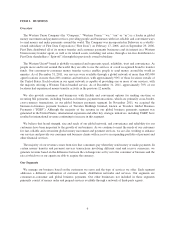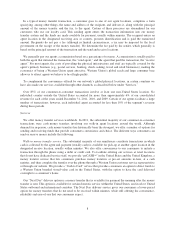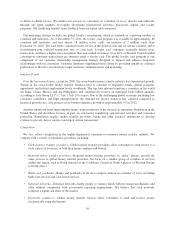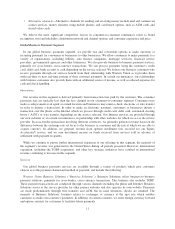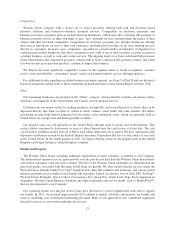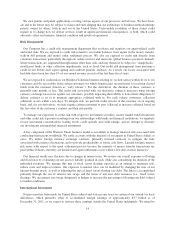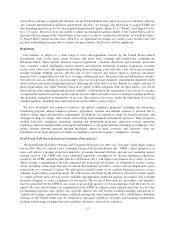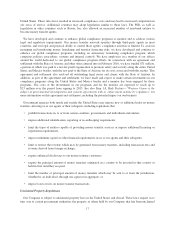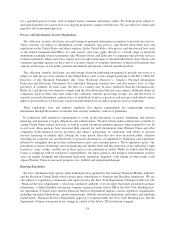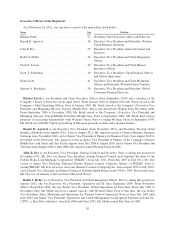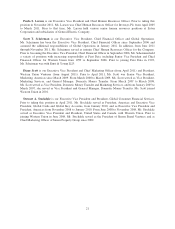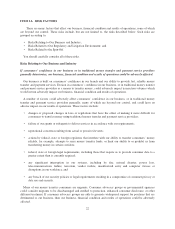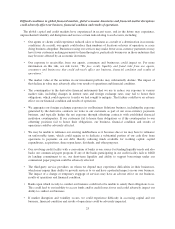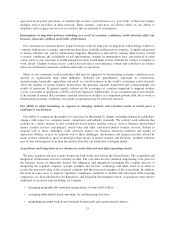Western Union 2011 Annual Report Download - page 22
Download and view the complete annual report
Please find page 22 of the 2011 Western Union annual report below. You can navigate through the pages in the report by either clicking on the pages listed below, or by using the keyword search tool below to find specific information within the annual report.invest these earnings to expand and diversify our global distribution and explore new service offerings and may
also consider international acquisition opportunities. In 2011, our foreign cash allowed us to acquire TGBP and
the remaining interests in two of our largest European-based agents, Finint S.r.l. (“Finint”) and Angelo Costa,
S.r.l. (“Costa”). However, if we are unable to utilize accumulated earnings outside of the United States and we
repatriate these earnings to the United States in the form of actual or constructive dividends, we would be subject
to United States federal income taxes (subject to an adjustment for foreign tax credits), state income taxes and
possible withholding taxes payable to various foreign countries. Such taxes could be significant.
Regulation
Our business is subject to a wide range of laws and regulations enacted by the United States federal
government, each of the states, many localities and many other countries and jurisdictions, including the
European Union. These include financial services regulations, consumer disclosure and consumer protection
laws, currency control regulations, money transfer and payment instrument licensing regulations, payment
service laws, rules, laws and regulations including those governing credit and debit cards, electronic payments,
foreign exchange hedging services and the sale of spot, forward and option currency contracts, unclaimed
property laws, competition laws and laws covering consumer privacy, data protection and information security.
Our services also are subject to an increasingly strict set of legal and regulatory requirements intended to help
detect and prevent money laundering, terrorist financing and other illicit activity. Failure to comply with any of
these requirements—by either Western Union or its agents or their subagents (who are third parties, over whom
Western Union has limited legal and practical control)—could result in the suspension or revocation of a license
or registration required to provide money transfer services and/or payment services or foreign exchange products,
the limitation, suspension or termination of services, the seizure of our assets, and/or the imposition of civil and
criminal penalties, including fines and restrictions on our ability to offer services.
We have developed and continue to enhance our global compliance programs, including our anti-money
laundering program, which comprises policies, procedures, systems and internal controls to monitor and to
address various legal and regulatory requirements. In addition, we continue to adapt our business practices and
strategies to help us comply with current and evolving legal standards and industry practices. These programs
include dedicated compliance personnel, training and monitoring programs, suspicious activity reporting,
regulatory outreach and education, and support and guidance to our agent network on regulatory compliance. Our
money transfer network operates through third-party agents in most countries, and, therefore, there are
limitations on our legal and practical ability to completely control those agents’ compliance activities.
Dodd-Frank Wall Street Reform and Consumer Protection Act
The Dodd-Frank Wall Street Reform and Consumer Protection Act (the “Act”) became United States federal
law in 2010. The Act created a new Consumer Financial Protection Bureau (the “CFPB”) whose purpose is to
issue and enforce consumer protection initiatives governing financial products and services, including money
transfer services. The CFPB will create additional regulatory oversight for us. Recent remittance regulations
issued by the CFPB, which become effective in February 2013, will impact our business in a variety of areas.
These include a requirement to provide enhanced pre-transaction disclosures, an obligation to resolve various
errors, including certain errors that may be outside the remittance provider’s control, and an obligation to cancel
transactions at a consumer’s request. We will need to modify certain of our systems, business practices, service
offerings or procedures at agent locations. We will also become liable for the failure of our money transfer agents
to comply with the rules and will need to establish and implement additional policies, procedures, and oversight
measures designed to assure compliance by our agents. The extent of these policies, procedures, and measures
may be considered by the CFPB in any action or proceeding against us for noncompliance with the rules by our
agents. We may also be subject to examination by the CFPB. In addition, rules adopted under the Act by other
governmental agencies may subject our corporate interest rate and foreign exchange hedging transactions to
centralized clearing, centralized trading, collateral posting and other requirements. Also, our Business Solutions
business in the United States may be subjected to increased regulatory oversight and licensing requirements
relating to the foreign exchange derivative products offered to certain of its customers.
15



